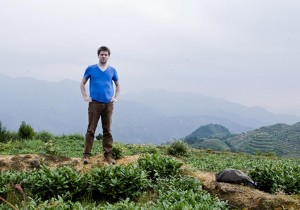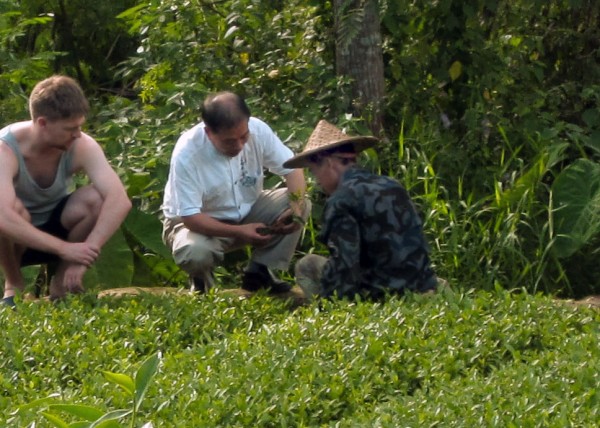An Interview with Chris West

The tea community in the western world is still relatively small. So small that most of us follow and interact with the same people on social media sites like facebook, Google+ and Twitter. This is where I initially met Chris West of Min River Tea. He has lived in China for 9 years and became a tea drinker gradually. Living in Fuzhou, capital of Fujian province he is surrounded by neighbours and friends who invariably have a relative with a tea farm. Fujian province has the largest variety of tea in China, but is most well-known for Oolongs such as Da Hong Pao from Wuyi Mountain and Tie Guan Yin from Anxi County.
I reached out to Chris a year ago to ask about farms I might visit on my trip to Fujian and he generously let me tag along while he visited some gardens and factories of potential suppliers. I was impressed with his considerable knowledge of tea, his approach to tea retail and his very capable command of Mandarin. He knows the region, local tea customs and has a finely honed sense of taste.
Chris kindly agreed to an interview. Here is his perspective on tea in China and the development of his company, Min River Tea.
What took you to China initially?
Originally it was Kung Fu – the first visit was in 2004 with my instructor from the Fujian White Crane club in London. After that, I came here about twice a year to train, and eventually moved permanently to Fuzhou to start learning Chinese.
Were you acquainted with leaf tea before you arrived in China?
Not even in the slightest. I was…. unappreciative. That’s probably the right word. I’d tried some Chinese tea, and had a vague feeling that I should be impressed, but secretly wasn’t. It’s the big gap – cola is easy to understand, beer has obvious benefits, but unless you’ve had that “aha” moment, Chinese tea is often difficult to get into.
Do you remember your first taste of Chinese tea? What was your impression?
The first proper Chinese tea was at my kung fu instructor Dennis’s house – some kind of rich, plummy red tea, possibly a Yunnan red or a Jin Jun Mei. I was kind of shocked. The tea was subtle, layered, had lots of tastes in there, and it had a story too about where it came from. That’s what I mean by the “aha” moment, I think most tea drinkers have probably been “initiated” into tea drinking in a similar way.

What do Chinese producers think of the western world’s relatively new interest in their tea?
They are proud, keen to find ways to export not just the product, but also the rich history and culture that goes with it. Like Lao Fu’s farm, one of our suppliers in Fu An (福安), his family were actually exporting Tan Yang Gong Fu tea to the UK a hundred years ago, then there was this big glaring gap, and now the export market is heating up again, so they’re excited by it.
At the same time they still don’t care that much. The domestic market is so hugely developed, so rich with educated and motivated buyers who will spend hundreds of dollars per kilo (and consider 10kg to be a retail amount) that most producers don’t really care that much about the export market. Why would you? It costs more to be an export farm, there’s more paperwork, you need to speak English, the farming and chemical safety standards are higher, and the customers tend to want cheaper teas. So… that’s a challenge.

There are many online teashops for tea lovers to choose from. What is unique about Min River Tea?
We’re here in China. Simple as that.
For us it’s about origins and authenticity. What we’re selling is an expensive product, absolutely, and customers are paying for something intangible – not just a taste and some leaves, but the story of the farm, the knowledge that the farmer’s heart and soul have gone into the product, the confidence that this is ‘the best’. Raphael (my business partner) and I are based in Fuzhou, both speak Chinese and we’re well engaged with the tea community here, so that comes out in the teas that we sell – each one is special, extensively sourced and represents something more than just an average brew.

When you visit tea suppliers in Fujian province what do you specifically look for in a tea?
Something unique. Anything that makes you lift your eyebrows a little bit and take notice.
The Chinese market plays to our advantage here actually. For example, the most expensive Tie Guan Yin (we call it Iron Buddha) should have a very rich, buttery aroma, a ‘mouth feel’ (texture) like the the water from a rice congee, that is to say a tiny bit thick and creamy, and quite a light taste. It’s called “zheng wei” and generally speaking, for a western palate, it doesn’t really taste great. So, we prefer to source a variety that’s called “tuo suan” (literally “delayed sour”) – it’s oxidised for a longer period, has a richer variety of tastes, and comes with a distinct tingly, cleansing feeling in the mouth. Our customers love it, and it makes perfect business sense too.
In your opinion what is the finest tea that Min River Tea offers?
We’ve just launched two teas that are fantastic – Sparrow’s Tongue and White Rooster. They’re both from a small private farm right on Wuyi Mountain run by a lady called Guan Chao Ying. She has been farming for decades, and actually now does consulting for large tea companies. This farm is her own private “pet project”, and most of the tea she produces goes to friends and family for free, with a small portion being sold to cover costs.

Have you noticed the market for premium tea is growing in the UK? Do you think North America is ahead of UK and EU in connections with tea growers and developing the customer base?
Good question! The UK market is growing – the economic crisis has slowed everything down a bit, but the overall trend in the UK is towards higher quality food and drink and so fine teas like ours are selling well, especially with 20-40 year olds.
But the UK lacks the wider choice that our American cousins have – the US tea world’s even got it’s own “Evil Corporation”, with Teavana getting bought out!! (joke…). Actually, the tea market needs to have both mainstream consumer-focused brands like Teavana as well as boutique companies like ours, so I’m happy they exist – smaller, niche companies will always rely to some extent on the ‘feeder’ effect of large companies like Teavana.
Generally, I think sourcing is the big elephant in the room for the tea industry. A few larger companies have been hit by scandals surrounding the quality of their products (ie. entire product ranges not passing standard chemical tests) while most small companies tend to repeat the standard mantra (“organic, from the farm etc….”) but how many are really actively engaged with Chinese tea growers? How many visit China more than 2 times a year? How many have staff that speak Chinese, and really understand the business/agriculture environment here? Who really has a handle on where their tea came from and if it’s safe? As a whole, the tea industry needs to work harder on providing honest, open sourcing that follows strict standards.
How far afield does Min River Tea ship?
We once hand delivered to South Africa! Beat that!
Thanks Chris. Min River Tea also has some nice tea ware on their site. Chris’s Chinese Tea Blog is definitely worth reading. There are many ‘insider’ posts that provide the reader with information not available anywhere else. When you visit Min River Tea you will see that prices are in British £, but Chris will ship anywhere.
Min River Tea on facebook and on Twitter




